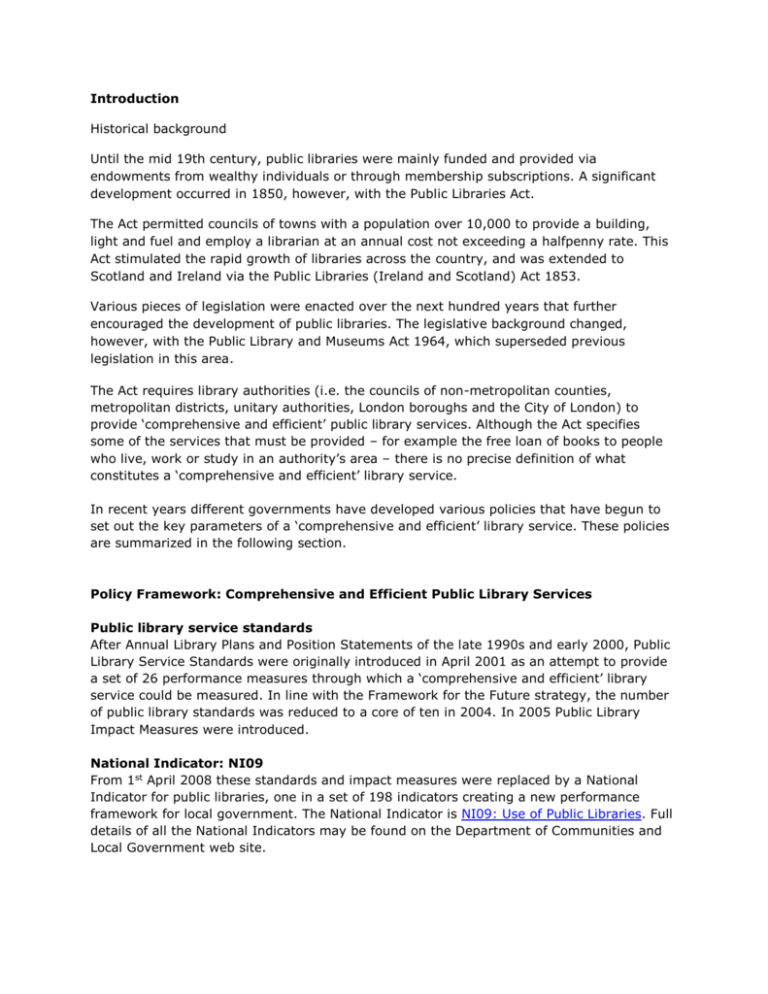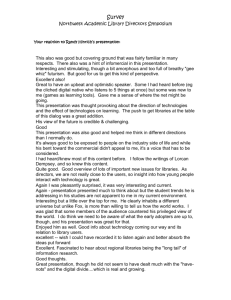Public_libraries_Cipfa_draft2_27102009155026
advertisement

Introduction Historical background Until the mid 19th century, public libraries were mainly funded and provided via endowments from wealthy individuals or through membership subscriptions. A significant development occurred in 1850, however, with the Public Libraries Act. The Act permitted councils of towns with a population over 10,000 to provide a building, light and fuel and employ a librarian at an annual cost not exceeding a halfpenny rate. This Act stimulated the rapid growth of libraries across the country, and was extended to Scotland and Ireland via the Public Libraries (Ireland and Scotland) Act 1853. Various pieces of legislation were enacted over the next hundred years that further encouraged the development of public libraries. The legislative background changed, however, with the Public Library and Museums Act 1964, which superseded previous legislation in this area. The Act requires library authorities (i.e. the councils of non-metropolitan counties, metropolitan districts, unitary authorities, London boroughs and the City of London) to provide ‘comprehensive and efficient’ public library services. Although the Act specifies some of the services that must be provided – for example the free loan of books to people who live, work or study in an authority’s area – there is no precise definition of what constitutes a ‘comprehensive and efficient’ library service. In recent years different governments have developed various policies that have begun to set out the key parameters of a ‘comprehensive and efficient’ library service. These policies are summarized in the following section. Policy Framework: Comprehensive and Efficient Public Library Services Public library service standards After Annual Library Plans and Position Statements of the late 1990s and early 2000, Public Library Service Standards were originally introduced in April 2001 as an attempt to provide a set of 26 performance measures through which a ‘comprehensive and efficient’ library service could be measured. In line with the Framework for the Future strategy, the number of public library standards was reduced to a core of ten in 2004. In 2005 Public Library Impact Measures were introduced. National Indicator: NI09 From 1st April 2008 these standards and impact measures were replaced by a National Indicator for public libraries, one in a set of 198 indicators creating a new performance framework for local government. The National Indicator is NI09: Use of Public Libraries. Full details of all the National Indicators may be found on the Department of Communities and Local Government web site. Framework for the Future Published in 2003, Framework for the Future (F4F) was drawn up by the DCMS, representatives of the public library sector and other key stakeholders. It is the first ever national public library strategy and it identifies the following key areas where libraries may potentially make their biggest contribution to the lives of people and the development of communities: the promotion of reading and informal learning; providing access to digital skills and services (including e-government); tackling social exclusion, building community identity and supporting active citizenship. Included within F4F is an 11-point vision that will be delivered by 2013. The Museums, Libraries and Archives Council (a strategic body funded by the DCMS) launched a library action plan in 2008, which may be accessed via this link to the MLA web site. Further to this, Roy Clare, Chief Executive of MLA, has set out some key factors that define a modern public library service. DCMS Modernisation Review In October 2008, the Secretary of State for Culture, Media and Sport announced a Library Service Modernisation Review to “define the Government’s vision for a modern, world-class public library service and set out the necessary steps to achieve this vision”. The results of the review were due to be announced in summer 2009, now postponed until autumn 2009. Key agencies There are a number of key agencies involved in the public library sector: Museums, Libraries and Archives Council – www.mla.gov.uk; Society of Chief Librarians – www.goscl.com/; Chartered Institute of Library and Information Professionals – www.cilip.org.uk; Department for Culture, Media and Sport – www.culture.gov.uk.







